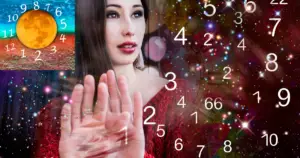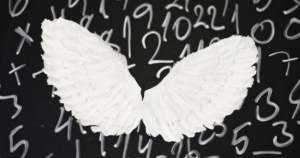Who Invented Angel Numbers And When? Important Facts

Before delving into all about Angel Numbers and their symbolism it is better to also know who invented Angel Numbers. The metaphysical world has been rocked by the popularity of angel numbers. They provide individuals who receive them with hope and comfort when used as a source of direction and inspiration.
Although the true history of angel numbers is buried in secrecy, there are few antiquated writings and books that provide intriguing hints. You’ll learn that a variety of beliefs, religious texts, and even new-age gurus can all be linked to these enigmatic numbers rather than just one single person. If you are wondering can angel numbers be negative or bad, click here.
Table of Contents
Who Invented Angel Numbers?

Some claim that Pythagoras, a Greek philosopher, was the first to recognize the vibrational frequencies of numbers and recognize their potential to assist us in establishing connections with the world around us and the angelic realm. Other top researchers think that angelic beings themselves developed this mechanism to interact with mankind. However, these numbers were said to carry ominous warnings. Angel numbers also have a religious connection.
God sent number 111 to warn Earth’s inhabitants of an approaching flood in the Book of Enoch, an old Christian text. The numbers 222 and 333 were sent to warn of impending major earthquakes and the end of the world, respectively. While it is impossible to confirm the truth of these assertions, it is evident that angel numbers have been used for centuries to convey messages from the divine. It is important to know the warning signs from your Angel numbers, click here to know.
The Story Behind Angel Numbers

Angelic numbers appear to be more common than before. Many people may be aware of their purposes, but they might not be aware of their histories. Angel numbers had been utilized for centuries before the New Age movement, but according to common belief, this movement is frequently attributed to popularising them.
Even if it is safe to assume that one person should be given the most credit for greatly influencing the “creation” of angel numbers, experts believe it is not clear when they were first used. History believes that Pythagoras, a historical figure, and the development of numerology are the sources of angel numbers. One of the most extensively utilized types of numerology was created by Pythagoras in the sixth century B.C.
Since his creation, angel numbers like 555 have been linked to transformation, atonement, passion, and having a life purpose that necessitates a closer relationship with God. Experts concur that some numbers have a spiritual significance in the Christian Bible. Some have questioned whether Christian doctrine also influences the meanings still attached to angel numbers as a result of this.
Who came up with Numerology?

The study of the mystical, divine relationship between numbers and the cosmos is known as numerology. It is an age-old process that has been utilized for millennia to reveal the secret significance of numerological sequences.
- Sumerian cultures are credited with creating the first known numeral system circa 4,500 BC.
- 3,000 BC: Egyptians created number hieroglyphs and numbers for measuring and counting.
- Numbers were utilized by the Mayans to keep track of time and make sacred calendars around 1500 BC.
- Pythagoras discovered numerology and studied the relationship between numbers around 600 BC.
Numerology can be utilized, according to new age teachings, to discover your life’s purpose, locate your ideal spouse, or even comprehend your karma. It can also be employed as a tool for personal development and self-discovery. The fundamental tenet of numerology is that everything vibrates at a specific frequency, each with its unique characteristics.
We can obtain comprehension of the hidden energies operating in our life by comprehending the vibrational frequency of each number. Pythagoras, a famous Greek philosopher, and a mathematician are credited with being the founding father of western numerology. He had an intense fascination with numbers and how they connected us to the building blocks of the universe. So much so that he founded a Pythagorean Academy where he and his students would attempt to decode the ‘language of the universe.
He believed that everything in time and space could be expressed through numbers and that these numbers held extraordinary power and meaning. His findings were astonishing, to say the least; For many years following Pythagoras’ demise, this hypothesis was dormant. His ideas weren’t widely accepted, and some people thought they were the work of “dark forces” or “the devil.”
Pythagoras’s assertion that he was the incarnate son of the Greek god Hermes, who bestowed upon him the ability to see and remember his prior lives, undoubtedly didn’t help matters. Did you know that his academy was regarded as a cult as well? When they solved a mathematical theorem, they would rejoice by offering an ox as a sacrifice to the gods. They prayed to the number 8 for the wealth it would bring them.
Does the Bible talk about Numerology?
Numerology, according to some, is not biblical. Although it has been practiced for many centuries, numerology is not addressed in the Bible. Christianity in many forms genuinely views numerology as an “abomination.” Why? Well, numerology is founded on the notion that each number has a deeper significance. But according to the Bible, only God has an inherent meaning, and since numbers are neutral, they have no inherent value.
Many devoted Christians argue that neither angels nor numbers are ever used by God to communicate. If God were to communicate with you, it would be through a vision, a dream, or some other sort of audible communication. Additionally, various fields of numerology frequently incorporate paganism, including astrology. Astrology is categorically banned in the Bible as a method of divination.
So, to answer your question, no, numerology and angel numbers are not part of the Bible. But that doesn’t mean that some followers don’t rely on angel numbers for advice.
Difference between Angel Numbers and Numerology

Numerology and angel numbers are frequently used interchangeably, however, there is a slight distinction between the two. While angel numbers explicitly pertain to messages that are believed to be sent by angels, numerology is the more comprehensive study of the energy and meaning behind numbers. The term “angel numbers” is thought to have originated in the New Age movement.
How many Angel Numbers are there?
The fact that each angel number has a unique meaning is one of my favorite things about them. One individual might see the number “333” as a sign that they are on the correct path, while another person might interpret it as confirmation of their intuition. My advice is to pause when you see an angel number, grab a pen and paper (or your phone’s notes app), and write down any ideas, impressions, or thoughts that come to mind. By doing this, you can develop a special connection with that angel number and, whenever it appears in the future, you will already be aware of its significance for you.
If you are worried about why you are not seeing Angel Numbers, click here to know.
However, different numbers in numerology have distinct meanings, so when you start to forge your special connection with angel numbers, you can use the potent spiritual interpretations of digits to comprehend the significance of particular sequences:
- 000 or 0000
- 111 or 1111
- 222 or 2222
- 333 or 3333
- 444 or 4444
- 555 or 5555
- 666 or 6666
- 777 or 7777
- 888 or 8888
- 999 or 9999



